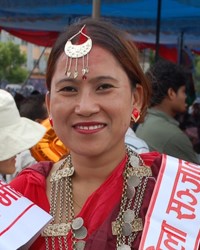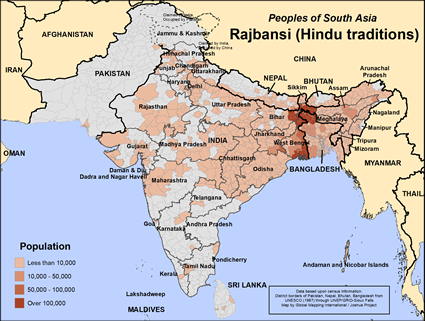Rajbansi (Hindu traditions) in Bhutan

Photo Source:
Copyrighted © 2026
International Mission Board-SBC All rights reserved. Used with permission |

Map Source:
People Group data: Omid. Map geography: UNESCO / GMI. Map Design: Joshua Project.
|
| People Name: | Rajbansi (Hindu traditions) |
| Country: | Bhutan |
| 10/40 Window: | Yes |
| Population: | 10,000 |
| World Population: | 8,768,000 |
| Primary Language: | Rangpuri |
| Primary Religion: | Hinduism |
| Christian Adherents: | 1.81 % |
| Evangelicals: | 0.00 % |
| Scripture: | New Testament |
| Ministry Resources: | Yes |
| Jesus Film: | Yes |
| Audio Recordings: | No |
| People Cluster: | South Asia Dalit - Rajbansi |
| Affinity Bloc: | South Asian Peoples |
| Progress Level: |
|
Introduction / History
The Rajbansi are a people who live in the small, mountainous country of Bhutan in Asia. Most of the Rajbansi live in other South Asian countries such India, Bangladesh and Nepal. They reside in the foothills and valleys of the highest range of mountains in the world, the Himalayas.
The Rajbansi are a dark-skinned people of medium height. Their primary language is Rangpuri. Some of them also speak Hindi, Assamese and Bengali.
The Rajbansi migrated to Bhutan approximately 300 years ago, and although their origins are unclear. One legend says they are the descendants of the children of a Bengali man and an Arakan woman. Other legends declare them to be an ancient people descended from the Dravidian race who lived in southern India. Many of the Rajbansi are unable to read or write. Many do not have access to modern medical care or conveniences like electricity and indoor plumbing.
Where Are they Located?
Most of the Bhutanese Rajbansi live in the Western province of Bhutan. Smaller groups live in other regions of Bhutan.
What Are Their Lives Like?
Most Rajbansi are subsistence farmers. They survive on the produce of their own labor. Although they raise some livestock, they do not seem to consider the animals as a primary source of income. Instead, animal products are used as items to sell to purchase necessities that they can't make or grow themselves. A shortage of suitable arable land, and poor farming methods all contribute to a low level of food production. They are excellent weavers, and some have begun to earn money by their weaving. Others work for the government or find employment in the private sector. As a whole, they live impoverished lives. The Rajbansi are hesitant to change their lifestyle, and they struggle to learn new types of work.
Rajbansi houses are made of wood, bamboo, thatch, and mud are clustered in villages ranging from ten to one hundred buildings. As in all patriarchal societies, the father is the undisputed head of the household. Most homes are composed of a basic family unit (parents and their children) until the oldest son marries. He and his wife then live with his parents until the second son marries. When the family head dies, all authority and responsibilities are transferred to the eldest son. Most marriages are arranged, and weddings are conducted according to traditional Hindu rites and rituals.
The Rajbansi dress very simply. Western style clothing is slowly becoming more common. The main foods of the Rajbansi are barley, potatoes, wheat, vegetables and dairy products.
What Are Their Beliefs?
The Rajbansi are Hindus who mix their Hinduism with folk religion. Every Rajbansi village has a separate hut dedicated to the worship of the Hindu goddess of death and sex, Kali. Though the Rajbansi celebrate the Hindu festivals of Dasai and Tihar, the Rajbansi do not observe them the same way Hindus do in India. Like many tribal peoples, the Rajbansi do not use Brahmins but have their own priests, monks and shamans. Their religion consists of paying proper respect to their ancestors and in appeasing evil spirits by performing various rituals.
There is a tiny group of believers among the Rajbansi. The JESUS film is available in the language of the Rangpuri as well as some Bible books.
What Are Their Needs?
Bhutan is an isolated nation and the Rajbansi are an isolated people in Bhutan. The Rajbansi need help in educating their children. They need help in obtaining modern medicine and in improving their crop yields so they will have more to trade. Most of all, they need to hear the life-changing message of Jesus Christ in a way they can understand.
Prayer Points
Pray for workers to catch a vision for reaching the Rajbansi people for Jesus and that in God's sovereign timing the hearts of the Rajbansi people would be open and ready to follow him.
Pray for believers in northeast India to reach out and share the gospel with the Rajbansi.
Pray for the spiritual lives of the Rajbansi people to become fruitful as they follow Christ.
Pray for the lives and culture of the Rajbansi people to evidence the rule and reign of the Kingdom of God.